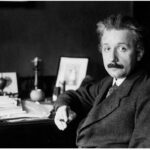Albert Einstein (1879-1955) was a German physicist and a great mathematician. He was one of the most famous and admired figures in the history of mankind. He joined the ranks of humanity’s greatest geniuses by developing the Theory of Relativity, a revolution in modern-day physics.
He also established the famous relationship between mass and energy and formulated the equation E = mc². He received a grand Nobel Prize in Physics for his discoveries on the law of photoelectric effects.
Contents
Early Childhood and Training
The great Albert Einstein was born in Ulm, Germany, on March 14, 1879. His father was a famous Jewish industrialist and a renowned businessman; Einstein, with his family in 1880, moved to the city of Munich.
When he was only six years old, he started to learn music and concentrate on violin classes. After that, during his childhood, he attained success in the studies of material science, math, and philosophy. After secondary education in Ulm, he entered the Polytechnic Institute of Zurich, Switzerland, wherein, in 1900, he finished his certification in Physics.
In 1901 he wrote his first scientific article, “The Investigation of the State of the Ether in the Magnetic Field.” In February of the same year, he received Swiss citizenship. Afterward, he accepted a post at Bern’s patent department. On January 6, 1903, he married Mileva Maric, with whom he had three children.
Scientific Essays
In 1905, the year Einstein completed his doctorate, he published four scientific essays, each with a major discovery in the field of physics:
- In the first, he made a theoretical analysis of Brownian motion, produced by the collision of particles of a liquid on microscopic bodies introduced into it.
- In the second, he formulated a new theory of light, with the important concept of a photon, based on the quantum theory proposed in 1900 by the physicist Max Planck.
- In the third, he exposed the initial formulation of the theory of relativity.
- In the fourth work, he proposed a formula for the equivalence between mass and energy, the famous algebraic equation: (E = mc²). This means that energy is equal to mass multiplied by the speed of light squared.
Theory of relativity
On November 25, 1915, he made that big appearance at the Prussian Academy of Sciences and professed to have finished his comprehensive, very long-term look for a new and more profound comprehension of gravity. Then General Theory of Relativity, Einstein’s theory was well prepared and ready.
In the essay dedicated to relativity entitled “Electrodynamic Movement of Bodies,” Einstein states that space and time are relative and not absolute values, contrary to what was believed until then.
He states that the maximum speed of the universe is that of light and adds: “For a body moving at that speed, time would undergo an expansion, at the same time that space would contract.
In this way, the body that remained at rest would age in relation to the other body in motion.
The innovative new vision of the interactions between time, space, matter, energy, and gravity was a feat recognized as one of humanity’s greatest intellectual achievements.
Theory of Happiness
In November 1922, Albert Einstein was on a tour of Japan, holding lectures and installed at the Imperial Hotel in Tokyo; instead of tipping the bellhop, the scientist handed him two handwritten notes explaining how to achieve happiness and delivered them to the charger.
A note on the hotel’s letterhead reads: “A simple and peaceful life brings more joy than the pursuit of success in constant restlessness.” The other note, written on a single sheet of paper, says: “Where there is a desire, there is a way.”
The handwritten sheets, in which Albert Einstein explains how to achieve a happy life, which had a relative of the hotel porter, were auctioned on October 24, 2017, at the Winner auction house, for 1.56 million dollars.
Last year pacifism
In 1933, Albert Einstein resigned from his posts in Germany, where the Nazis were already in power and went into exile in the United States. He went on to teach at the Institute for Advanced Study at Princeton University, of which he would become a director.
In 1939, concerned about the development of nuclear weapons, the scientist wrote a letter to President Franklin Roosevelt about the danger Germany had gone ahead in discovering the possibilities of nuclear energy. Soon after, the American head of state began the Manhattan Project. In 1940, Einstein received American citizenship.
Atomic bomb and Death
After the war, Albert Einstein became an activist for international disarmament and world government and continued to contribute to the cause of Zionism. In the late 1940s and early 1950s, he championed in the United States the idea of maintaining political freedom.
Six years later, on August 6, 1945, an atomic bomb was dropped on the Japanese city of Hiroshima, devastating six hundred city blocks. A few days later, another bomb was dropped on the city of Nagasaki.
After World War II, Einstein joined other scientists fighting to prevent the bomb from being used again. He established a worldwide atomic weapons control organization. Albert Einstein passed away in Princeton, United States, on April 18, 1955.
Albert Einstein Quotes
“The sole purpose of education must be to prepare individuals to think and act as individuals – independent and free.”
“If my theory of relativity turns out to be correct, Germany will claim that I am German, while France will claim that I am a citizen of the world. But if my theory fails, France will remember that I am German, and Germany will remember that I am Jewish.”
“Humanity’s great problem is not in the realm of science, but in the realm of human hearts and minds.”
“Life is an uninterrupted becoming, never a pure and causal being.”






